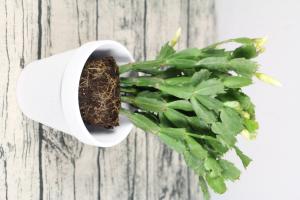Introduction
Potted plants are a great way to add some greenery to your home or office space. They beautify the surroundings and are also an excellent way to reduce stress levels. But one of the most important aspects of caring for potted plants is to ensure they receive regular and appropriate feeding. So, how long should you feed potted plants? Let’s find out!
Understanding the Feeding Needs of Potted Plants
Before we dive into the details of how long to feed potted plants, it is important to understand their feeding needs. Potted plants require a different feeding regime than those grown in gardens, as they have limited space and soil to extract nutrients from. The nutrients in the soil of potted plants can become depleted over time and need to be replenished through fertilization.
The Frequency of Fertilization
The frequency of fertilization depends on the type of plant and its growth stage. Generally, most potted plants require fertilization once every two to four weeks during the growing season, which is from spring to fall. However, during the dormant season that is from winter to early spring, fertilization frequency can be reduced. It is best to follow the instructions provided on the fertilizer bottle or consult a gardening expert to determine the appropriate feeding schedule for your potted plants.
The Amount of Fertilizer to Use
The amount of fertilizer to use depends on the type and size of the plant, the size of the container, and the potency of the fertilizer. Most fertilizers come with instructions on how much to use, and it is crucial to follow them accurately. Overfeeding can harm the plant, while underfeeding may not provide the nutrients required for growth. A good rule of thumb is to use half the recommended dose if you are unsure how much to apply.
Important Factors to Consider
Several important factors need to be considered while feeding potted plants. Firstly, avoid feeding plants during their dormant season, as they might not require as many nutrients as during the growing season. Secondly, water the plant before applying fertilizer to avoid burns. Thirdly, always use a high-quality fertilizer that is suitable for the type of plant you have. Lastly, it is crucial to monitor the plant's growth and adjust the feeding schedule as required.
The Bottom Line
In conclusion, potted plants require consistent and appropriate feeding to maintain their health and growth. Feeding frequency, amount, and type of fertilizer used are all vital factors that need to be considered while caring for potted plants. By following the right feeding regime, you can enjoy healthy and flourishing plants that beautify your surroundings and keep you healthy and happy all year round.

 how many times do yo...
how many times do yo... how many planted tre...
how many planted tre... how many pine trees ...
how many pine trees ... how many pecan trees...
how many pecan trees... how many plants comp...
how many plants comp... how many plants can ...
how many plants can ... how many plants and ...
how many plants and ... how many pepper plan...
how many pepper plan...



























